Court’s decision
The Madras High Court set aside the administrative order withdrawing the petitioner’s freedom fighter pension, holding that the authority had failed to conduct a fair enquiry or consider relevant material before cancelling a long-standing welfare entitlement. The Court observed that once a pension under the freedom fighter scheme is granted after verification, its withdrawal must be supported by cogent reasons and proper procedure. The Court directed the competent authority to undertake a fresh consideration after giving the petitioner an opportunity to produce records and explaining the basis of any alleged discrepancies. Until such reconsideration, the Court protected the petitioner from arbitrary deprivation of benefits.
Facts
The petitioner, who had been sanctioned a freedom fighter pension under a State welfare scheme, was later issued a show cause notice alleging discrepancies in the documents submitted. The administration eventually passed an order withdrawing the pension without granting a personal hearing or evaluating the petitioner’s explanation. The petitioner argued that he had participated in the national movement and had already produced certificates, including secondary evidence endorsed by responsible public figures. The administration insisted that doubts had been raised during an internal verification, which justified withdrawal. Aggrieved by the abrupt cancellation, the petitioner approached the Madras High Court seeking to quash the withdrawal order.
Issues
The High Court considered the following legal issues:
- Whether a freedom fighter pension, once sanctioned after initial scrutiny, can be withdrawn without due process.
- Whether the administrative authority failed to provide adequate notice, opportunity, and reasons prior to withdrawing the benefit.
- Whether the absence of original records or minor discrepancies can justify depriving an elderly beneficiary of a long-standing welfare entitlement.
- Whether the authority adhered to principles of natural justice and procedural fairness in the decision-making process.
Petitioner’s arguments
The petitioner contended that the withdrawal was arbitrary because he was never granted a fair hearing and the administration relied solely on internal suspicion rather than concrete evidence. He explained that the events in question occurred decades ago and original records were often unavailable for freedom fighters due to the nature of underground activity and the political environment at the time. He emphasised that he had supplied all possible documentation, including officially recognised secondary evidence. The petitioner argued that freedom fighter pensions are not charity but acknowledgements of sacrifice, and procedural lapses or incomplete archives cannot be grounds to penalise beneficiaries.
Respondent’s arguments
The State authorities argued that the petitioner failed to substantiate his claim with primary documentary proof and discrepancies emerged during a verification process. They maintained that administrative authorities are empowered to cancel pensions granted on insufficient or doubtful material. They contended that the petitioner had been notified and asked to respond to the discrepancies, and therefore principles of natural justice had been satisfied. They insisted that the welfare scheme requires strict adherence to eligibility conditions, and mere suspicion regarding the reliability of certificates justified their decision to withdraw the pension until proper evidence was produced.
Analysis of the law
The Madras High Court clarified that freedom fighter pensions occupy a distinct constitutional space as State recognition of sacrifices made during the independence movement. Courts consistently hold that such pensions cannot be treated like ordinary financial grants. Any withdrawal requires strict compliance with natural justice, including clear notice, opportunity to respond, and reasoned order. The Court rejected the idea that administrative suspicion alone could override long-standing entitlement. It reiterated that authorities must adopt a liberal and humane approach when evaluating evidence relating to events that occurred before independence, where documentation is often scarce or lost.
Precedent analysis
The Court relied on earlier judgments emphasising that freedom fighter pensions must be evaluated with sensitivity due to the historic circumstances under which participants operated. It referred to Supreme Court rulings where administrative bodies were reminded that strict documentary standards cannot be imposed on events that occurred nearly a century ago. The Court also invoked precedents requiring that pension withdrawal must be justified by compelling evidence and not mere procedural deficiency. These precedents influenced the Court’s view that the impugned order was mechanical, lacked reasoning, and violated the beneficiary’s legitimate expectation of continuity.
Court’s reasoning
The Madras High Court reasoned that the respondents failed to demonstrate that they considered the petitioner’s explanation before withdrawing his pension. The authority did not record why the secondary evidence was insufficient or what material contradicted the petitioner’s claim. The Court noted that administrative fairness requires transparency: authorities must explain the basis of any doubt and evaluate the beneficiary’s reply objectively. The Court observed that the order of withdrawal was cryptic, devoid of analysis, and failed to comply with principles of natural justice. The Court concluded that the petitioner had been denied a meaningful opportunity to defend his entitlement.
Conclusion
The Madras High Court quashed the withdrawal of the freedom fighter pension and remitted the matter for fresh consideration. The authorities were directed to provide a personal hearing, examine all documents, assess the beneficiary’s explanation, and pass a reasoned order. The Court emphasised that welfare schemes must not be implemented in a punitive manner and that freedom fighters’ contributions deserve respect, not bureaucratic scepticism. The writ petition was allowed with specific directions to complete the reconsideration within a prescribed time.
Implications
The ruling reaffirms that freedom fighter pensions cannot be withdrawn without rigorous procedural safeguards. It compels authorities to adopt a liberal evidentiary approach, recognising the historical context and scarcity of records from the pre-independence era. The judgment strengthens jurisprudence on natural justice and protects elderly beneficiaries from abrupt administrative decisions. It also serves as guidance for government departments to maintain transparency and sensitivity in verifying old claims. Going forward, this decision ensures that dignity and recognition associated with the pension are not lost to rigid proceduralism.



